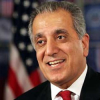Zalmay Khalilzad

Zalmay Khalilzad
Zalmay Mamozy Khalilzadis a U.S. counselor at the Center for Strategic and International Studiesand president of Khalilzad Associates, an international business consulting firm based in Washington, D.C. He was the United States Ambassador to the United Nations under President George W. Bush. He has been involved with U.S. policy makers at the White House, State Department and Pentagon since the mid-1980s, and was the highest-ranking Muslim American in the Administration of U.S. President George W. Bush. Khalilzad's previous assignments in...
NationalityAmerican
ProfessionPolitician
Date of Birth22 March 1951
CountryUnited States of America
At this point the determination is to meet the August 15 deadline.
Since no single party will have a majority there will be a need for a very broad-based coalition.
I do believe it's possible that we could adjust our forces, downsizing them in the course of next year. That's possible given the positive political developments and continuing growth in the capabilities of the Iraqi forces,
will depend not only on our military strategy, but also on the political progress.
We have opened the Pandora's box and the question is, what is the way forward? If another incident (occurs), Iraq is really vulnerable.
The U.S. and Iraq will work together next year to shift Iraqi resources from unproductive subsidies to productive uses that enable Iraqis to earn livelihoods.
It is important that the Iraqi people have confidence in the election results and that the voting process, including the process for vote counting, is free and fair.
Success in Iraq will be a major setback for terrorists and a major asset for the security of this region. The struggle for Iraq is the struggle for the future of the world.
The national unity government will need to implement a program that brings all Iraqis together, builds a happy future for the people of Iraq, and gets Iraq to stand on its own feet.
I constantly signal to the Iraqi leaders that our patience, or the patience of the American people, is running out
The feeling of being an Iraqi unites all ethnic groups within this country. Even the Kurds, who have traditionally pushed for their own state, see the benefits of the current situation. They enjoy an autonomous status in Kurdistan, while at the same time participating in decisions in Baghdad. But if neighboring states were to push for a partition of Iraq, it would be a horrible mistake.
Iran is undertaking a massive effort to expand its influence in southern Iraq. At the same time, that influence decreases the more the political process in Iraq progresses.
We can't say whether Tehran is supporting Al Qaeda, but we do know that al-Qaida people come here from Pakistan through Iran.
Americans have eliminated Iran's worst enemies, the Taliban in Afghanistan and Saddam [Hussein]. I occasionally threatened my Iranian counterpart in Kabul that one day I would send him a big bill for what we did. But, seriously, Iran is pursuing a dual strategy in Iraq. On the one hand, the Iranians, after decades of hostility, are now interested in good relations. On the other hand, they want to keep the country weak and dominate the region.